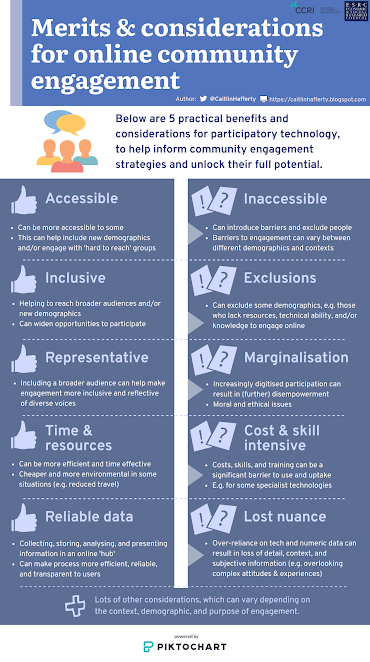What's my PhD about and why is it important?
I am currently in the final year of my PhD, which is being conducted within the ESRC Wales Doctoral Training Partnership (DTP). My PhD focuses on developing best practice stakeholder in the digital age. Specifically, it explores practitioners' perspectives on the challenges and opportunities for participatory environmental decision-making.
My PhD is interdisciplinary (drawing from multiple areas of knowledge) and participatory (involving non-academic interest groups). It focuses on 'what works' for best practice stakeholder engagement in planning and environmental decision-making processes in a UK context. The research considers the following questions:
- How effective are digital tools for meeting the principles, goals, and criteria of engagement?
- What are the challenges for institutionalising engagement and how can they be overcome?
- What recommendations can be made to enhance current understandings (including theories, typologies, models, and frameworks) of best practice engagement?
By investigating these questions, the research aimed to explore the perceptions and experiences of interested groups and potential beneficiaries. This included practitioners and practice-enablers who were responsible for engaging in UK public, private, and third sector organisations. The focus of the research is on the perspectives of practitioners responsible for carrying out engagement within their organisation, rather than the participants of the engagement process (e.g., public and stakeholder groups).
There are unresolved questions about the effectiveness of digital tools for engagement, particularly whether the principles, goals, and criteria of best practice (e.g., promoting trust, inclusivity, and fairness in decision-making processes) can be met via digital and remote approaches. The COVID-19 pandemic added urgency of these questions, with technology-related disparities being brought sharply into focus. Current understandings of engagement (e.g., typologies, models, tools, and frameworks) do not fully consider the ethical issues and implications of technology. There is also a lack of consideration of the more fundamental reasons why these challenges are encountered, such as organisational restrictions for best practice, and a stronger evidence base is needed for institutionalising engagement.
The research methodology and participatory approach was designed with the aim of achieving tangible benefits in the real world, through making a difference to interested groups and potential beneficiaries of the research. This involved listening to the needs of, and engaging with, a range of non-academic stakeholders from the start and throughout the research process. The methods included:
- Providing an up-to-date critical review of ‘what works’ in stakeholder engagement, drawing from a comprehensive review of the interdisciplinary literature (including non-academic literature).
- A survey questionnaire (N=58) to provide a ‘snapshot’ of practitioners’ perspectives and experiences of engaging using digital (remote) tools during the pandemic.
- 34 in-depth interviews with practitioners and practice-enablers in the UK public, private, and third sectors (including government departments, non-governmental public bodies, consultancies, local authorities, not-for-profits, and research institutions).
- A case study to consider common themes in more detail with 5 interviewees from the same organisation.
The findings contribute to debates around the effectiveness of digital tools for participatory processes by providing a comprehensive understanding of both technical and ethical challenges (and how they can be overcome). The findings also respond to calls for a stronger evidence base for institutionalising engagement processes.
I am currently in the final stages of my research (writing up the results). I aim to make the findings publicly available, for example as an 1-page summary, as soon as possible. I am also designing some evidence-led resources which will be accessible online for free. Please feel free to get in touch if you'd like to discuss my research and its progress (chafferty1@glos.ac.uk).
 |
| Online community engagement infographic (Caitlin Hafferty, 2020). Source: Commonplace |